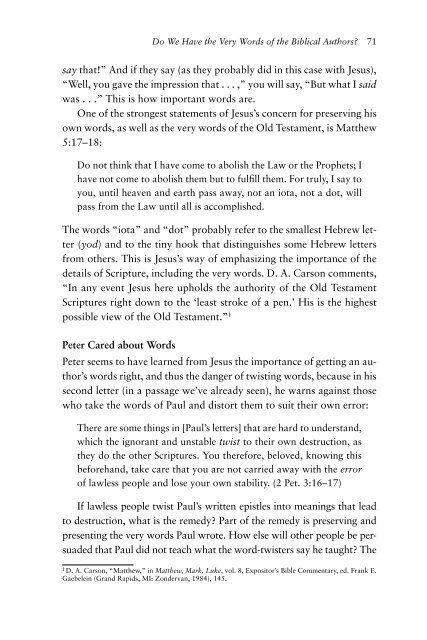Scriptures selfattesting authority question doctrine truthfulness Scriptures
peculiar-glory-en
peculiar-glory-en
Create successful ePaper yourself
Turn your PDF publications into a flip-book with our unique Google optimized e-Paper software.
Do We Have the Very Words of the Biblical Authors? 71<br />
say that!” And if they say (as they probably did in this case with Jesus),<br />
“Well, you gave the impression that . . . ,” you will say, “But what I said<br />
was . . .” This is how important words are.<br />
One of the strongest statements of Jesus’s concern for preserving his<br />
own words, as well as the very words of the Old Testament, is Matthew<br />
5:17–18:<br />
Do not think that I have come to abolish the Law or the Prophets; I<br />
have not come to abolish them but to fulfill them. For truly, I say to<br />
you, until heaven and earth pass away, not an iota, not a dot, will<br />
pass from the Law until all is accomplished.<br />
The words “iota” and “dot” probably refer to the smallest Hebrew letter<br />
(yod) and to the tiny hook that distinguishes some Hebrew letters<br />
from others. This is Jesus’s way of emphasizing the importance of the<br />
details of Scripture, including the very words. D. A. Carson comments,<br />
“In any event Jesus here upholds the <strong>authority</strong> of the Old Testament<br />
<strong>Scriptures</strong> right down to the ‘least stroke of a pen.’ His is the highest<br />
possible view of the Old Testament.” 1<br />
Peter Cared about Words<br />
Peter seems to have learned from Jesus the importance of getting an author’s<br />
words right, and thus the danger of twisting words, because in his<br />
second letter (in a passage we’ve already seen), he warns against those<br />
who take the words of Paul and distort them to suit their own error:<br />
There are some things in [Paul’s letters] that are hard to understand,<br />
which the ignorant and unstable twist to their own destruction, as<br />
they do the other <strong>Scriptures</strong>. You therefore, beloved, knowing this<br />
beforehand, take care that you are not carried away with the error<br />
of lawless people and lose your own stability. (2 Pet. 3:16–17)<br />
If lawless people twist Paul’s written epistles into meanings that lead<br />
to destruction, what is the remedy? Part of the remedy is preserving and<br />
presenting the very words Paul wrote. How else will other people be persuaded<br />
that Paul did not teach what the word-twisters say he taught? The<br />
1<br />
D. A. Carson, “Matthew,” in Matthew, Mark, Luke, vol. 8, Expositor’s Bible Commentary, ed. Frank E.<br />
Gaebelein (Grand Rapids, MI: Zondervan, 1984), 145.


